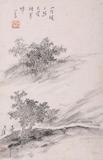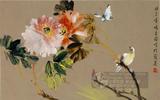宋四家真蹟 冊 宋黃庭堅致景道十七使君尺牘並和王仲至少監詠姚花詩四首
推薦分享
資源連結
連結到原始資料 (您即將開啟新視窗離開本站)後設資料
- 資料識別:
- 故書000236N000000003
- 資料類型:
- 類型:書法
- 型式:文字
- 著作者:
- 黃庭堅
- 出版者:
- 數位化執行單位:國立故宮博物院
- 格式:
- 第一幅 27.8x47.4公分、第二幅 27.6x38.3 公分、第三幅 26.7x28.8公分、第四幅 26.8x40.4 公分、第五幅 26.6x53.5 公分、第六幅 26.7x44.2公分、全幅 42.1x71.3公分
- 語言:
- 漢文
- 關聯:
- 石渠寶笈續編(重華宮),第三冊,頁1672-1676 &*故宮書畫錄(卷三),第一冊,頁146-151 &*故宮歷代法書全集,第十一冊,頁40-63、193-195&*1.何傳馨,〈黃庭堅致景道十七使君尺牘〉,收入林柏亭主編,《大觀- 北宋書畫特展》(臺北:國立故宮博物院,2006年初版一刷),頁373- 376。 2.何傳馨,〈宋黃庭堅書詩〉,收入何傳馨編,《書法之美特展圖錄》(臺北:國立故宮博物院,1992年五月初版一刷),頁73-74。 3.王競雄,〈「天子之寶 — 台北國立故宮博物院的收藏」展品系列(五) — 書法、圖書文獻〉,《故宮文物月刊》,第248期(2003年11月),頁9。 4.何傳馨,〈黃庭堅小楷氣象〈致景道十七使君尺牘並詩〉解讀〉,《故宮文物月刊》,第269期(2005年8月),頁16-29。 &*黃庭堅,字魯直,號山谷道人,洪州分寧(今江西省修水)人,和蘇軾、米芾、蔡襄同為北宋四大書家之一。 黃庭堅早年學周越但俗氣不脫,而後取法張旭、懷素、顏魯公、楊凝式,尤其得力於<瘞鶴銘>的神韻。此幅為小字,因此不見他行書中最著名攲側的結構、圓勁的筆勢和緩緩澀進的頓挫,不過,刻意拉長的橫劃和化線為點還是充滿黃氏個人的風格。本幅為「宋四家真蹟」冊之三。&*Huang T'ing-chien was a native of Kiangsi who, with Su Shih, Mi Fu, and Ts'ai Hsiang, was one of the Four Great Northern Sung Masters of calligraphy. In his early years, Huang studied the style of Chou Yueh (fl. ca. 1023-1048), but sought more ancient styles, later studying those of Chang Hsu, Huai-su, Yen Chen-ch'ing, and Yang Ning-shih. He was especially attracted to the archaic spirit of the Burying the Crane engraving. The characters here are small, so his famous slanted characters, rounded brushwork, and wavering manner of his running script is not apparent. Nonetheless, the intentional lengthening of horizontal strokes and line-like dots still suggest his unique style. This is leaf 3 from Album of Authentic Works by the Four Sung Masters.&*此作包含黃庭堅小楷書信一則,與七言絕句詩八首,根據內容可推定為約四十五歲(1089)時,贈送給宗室趙令率(生卒年不詳)的書跡。當時正是黃庭堅仕途生涯最為風光的時期,由於致贈的對象是皇親貴戚,述說的是在京城賞花吟月的愜意生活,因此在書法風格也展現出平和優雅的情態。 黃庭堅(1045-1105)字魯直,號涪翁、山谷道人,江西分寧人。他擅長於詩文、書法,和蘇軾、米芾、蔡襄並列為北宋四大書家。(20061206)&*Huang T'ing-chien, style name Lu-chih and sobriquets Fu-weng and Shan-ku tao-jen, was a native of Fen-ning, Kiangsi. He specialized in poetry and prose as well as calligraphy, being known in the latter along with Su Shih, Mi Fu, and Ts’ai Hsiang as one of the Four Masters of the Northern Sung. This work includes a letter written by Huang T'ing-chien in standard script as well as eight seven-character truncated verses. Judging from the contents, this was written around the age of 44 (1089) as a piece of calligraphy presented to Chao Ling-shuai (dates unknown), a member of the imperial clan. This period was when Huang T'ing-chien was at the prime of his career as an official. Since the recipient's status as a relative of the imperial family, and the contents narrating the pleasantries of life in appreciation of the moon and blossoms in the capital, the style of Huang T'ing-chien's calligraphy also reveals a joyful and upbeat mood.(20061206)
- 管理權:
- 國立故宮博物院
授權聯絡窗口
- 國立故宮博物院圖像授權、出版授權、影音資料授權-申請流程說明
http://www.npm.gov.tw/zh-TW/Article.aspx?sNo=03003061






